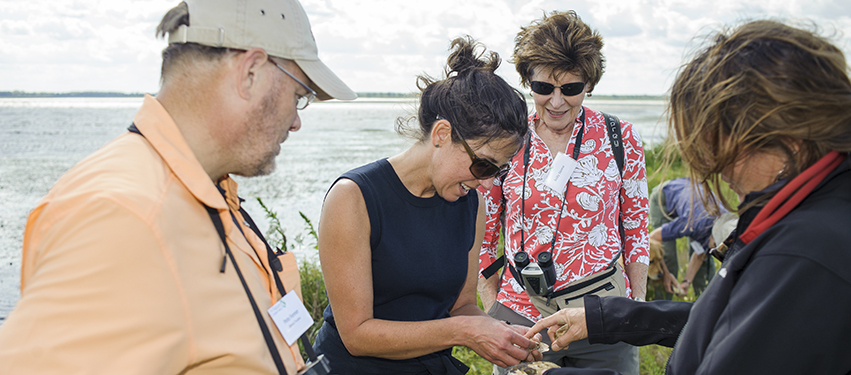Protecting the Nature That Protects Us

Michelle Carr, Illinois director for The Nature Conservancy, grew up outside Toledo, Ohio in a farm community along the Maumee River. School took her to St. Louis to study economics; Nashville for an MBA; and finally to Chicago, where she led an investment team at Goldman Sachs. Her hometown experience in the shadows of the grain elevator deeply shaped her care for the land and sustainability.
In high school, Carr remembers distinctly a lightning bolt of thought that she credits for blossoming her dedication to sustainability. In a 10th grade social studies class, she learned about Charles Thomas Malthus’ theory in the late 1800s positing that population would one day outstrip food supply. What if farmers could no longer meet that demand? This theory was debunked, as farmers increased productivity in ways not then imaginable. But the bigger, urgent questions of the growing population’s impact on our natural resources and how climate change would ultimately touch down in the state she now calls home remain at the forefront.
The Challenges of Resiliency
Here in Illinois, the effects of the climate crises are already here. Floods, extreme heat, drought—ask any farmer managing this uncertainty how very difficult it has been. It is projected that we will have between 60 and 90 days with temperatures above 90 degrees by the end of the century. Local and global health officials acknowledge the climate crisis as a human health crisis, exacerbating heat-related illness and spread of disease. Rural and urban residents alike have suffered greatly this year with pooled, muddy farm fields and washed-out residences, decreasing crop yields and in many cases displacing families from their homes.
Now, at the helm of the Conservancy in Illinois, Carr shares a key solution hiding in plain sight: Supporting nature itself plays a role in addressing the challenges of resiliency. “There are numerous threats to our water, our land and our food supply,” she explains. “But science shows that nature itself is often the solution to many of the challenges we are facing; therefore, we—individuals and businesses—need to invest in protecting nature, which protects us.”
In Illinois, the Conservancy has worked for years with farmers to provide support for wetland installation, which slows and purifies waters before they return to the lakes and rivers on which thousands of residents depend for drinking water. As members of the Illinois Soil and Agriculture Partnership, we bring options and information on the value of healthy soils and ensure that farmers and retailers have access to the latest tools so they can navigate the ever-changing landscape sustainably.
Creating Big, Scalable Solutions
Climate change affects Illinois’ delicate ecosystem as well. Rising waters and droughts create imbalances in plant and animal communities—even creating ideal habitats and longer growing periods for non-native and invasive species.
The Conservancy’s Emiquon Preserve, about 45 minutes southwest of Peoria, is one of the largest river restorations in the Midwest. There, an installed water control structure lets restored, high-quality waters flow into the Illinois River and allows drier conditions in the wetland areas—mimicking naturally occurring wet and dry periods that create optimal conditions for aquatic plants to grow and migratory birds to rest and refuel. Floodplains like Emiquon can take on rushing overflows from the Illinois River, allowing the water to slow down and spread out, settling sediment and flushing out pollution.

Carr offers a final example, noting that in Illinois—the Prairie State—less than one tenth of one percent of remnant prairies remain. At Nachusa Grasslands, a Conservancy site in western Illinois, deep investments in tools like prescribed fire, the return of bison as natural grazers, and a healthy stewardship and volunteer program to aid in the removal of invasive species and reseeding of native plants to the prairie have restored this now-thriving ecosystem. Carbon sequestration is a small, but important benefit of healthy prairies.
“A recent TNC study shows that natural solutions have the potential to capture 21 percent of the nation’s carbon pollution—that’s equivalent to removing all cars and trucks on the road,” Carr says. “These are big problems, but we are creating big, scalable solutions right here in Illinois. It is imperative that we collectively invest in these solutions to create resilient communities that will ensure that both people and nature thrive.”
Nachusa and Emiquon are just two examples of the places we work in Illinois, supporting the creation of scalable templates to enhance biodiversity, clean air and water and make our lands more sustainable—efforts that can be refined for densely populated urban communities. In Chicago, we work with a host of partners to support the inclusion of impervious surfaces, installation of trees and other green infrastructure which helps filter and absorb water, reduce temperatures, and provide habitat for various wildlife.
Taking Action for Change
The Conservancy is advancing pragmatic solutions around the world. In the U.S., all 50 state chapters are working toward solutions that are specific to their challenges. To that end, the Conservancy’s Our World campaign asks each state to join in supporting efforts to protect the nature that protects us. The Conservancy in Illinois hopes to raise an additional $10 million by June 2020 to advance current efforts and support the development of new solutions.
“Now more than ever, we need to work together to repair the damage to our planet—recent rollbacks and cuts to environmental policies make this work even more challenging,” Carr explains. “Along with support, we need Illinoisans to take action for change. Join us on workdays to plant trees, or find a local outdoor group to explore and appreciate the natural areas of our state. There are numerous ways to become involved—and we hope to be a resource for individuals, businesses and other groups to do so.” PM
For more information, visit nature.org/OurWorldIL.
- Log in to post comments

